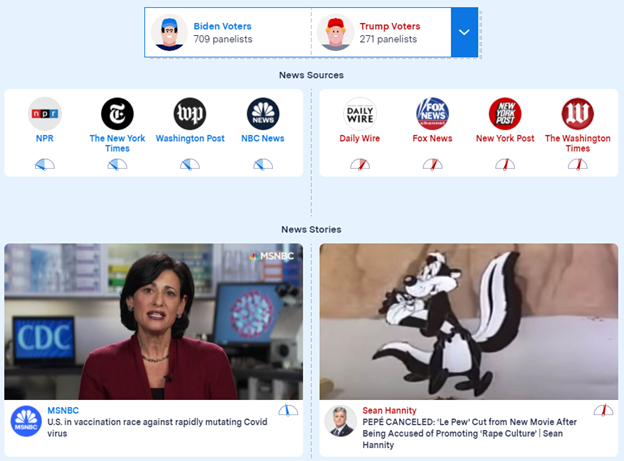Split Screen Bursts Our Online Bubbles
April 8, 2021
Does it feel like you’re living in a different reality than some of your friends and family members when it comes to politics? That’s because you probably are, at least for now. We spend a lot of time in our own curated online bubbles, but there’s a new tool from “The Markup” that can give you a glimpse into what someone else’s feed looks like. “Split Screen” is a project that puts content seen by different groups of people side by side so you can compare Biden vs. Trump voters, men vs. women, or baby boomers vs. millennials.
The “Split Screen” project aims to illustrate this by using data from panelists. The data shows examples of stories that appear, and the frequency that different groups were exposed to different sources. The panelists spend time using the site, and report what they see.
Facebook’s algorithm shows different news and ads to different people based on what it expects they will engage with. That means two people could be seeing different news, ads, and groups when they spend time on the site.
Facebook’s Vice President of Global Affairs, Nick Clegg, recently wrote in a Medium Post that people will naturally share content that causes stronger emotional reactions and that their automated systems were not designed to encourage sensational content sharing, as critics claim.
Still, the company has been under scrutiny, since the January 6th, terrorist attacks at the capitol, which were organized in part on social media sites including Facebook. As a way to increase transparency, a new feature was announced at the end of March that will allow users to switch to a “most recent” mode which shows posts in chronological order. It will allow you to chose which friends and pages you want to see.
In the meantime, the “Split Screen” project brings into focus one of the ways Americans are deeply divided when they go online. A visit to the site could be a good chance to reflect on how our lives are shaped by algorithms mostly outside of our control, or it could at least be a way to see what’s on your uncle’s Facebook feed this week.
Read more about the changes planned for Facebook:
https://www.npr.org/2021/04/01/983155583/facebook-disputes-claims-it-fuels-political-polarization-and-extremism



